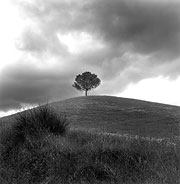
“Castelli in Chianti, Tuscany, Italy” by Norman Seider, photographed in 2001.
|
There are places in this world that grab our imaginations and won’t let go. Some we visited as children. Some we’ve never seen, but they’re built into our DNA: places that bring forth such strong feelings that we start to believe that we were there in another life. These are the kinds of places around the world that Norman Seider has photographed.
There are photographs taken in Antarctica, Ireland, Italy, Patagonia, and Argentina reprinted in two lovely books: Odyssey: Patagonia to the Antarctic, which won the Best Pictorial Book Award at the 2005 New England Book Show, and Opening Scenes: Photographs by Norman Seider.
“I make still moving pictures,” the artist said of his work. “Each photograph is an opening scene — a scenario ready to unfold.” Most of Seider’s scenes are uninhabited, but frequently they give the impression that something momentous has just occurred, or that someone’s lurking around a corner, waiting. When viewed from a distance, “Savannah, Georgia, 1998” looks like a Franz Kline painting, with its strongly contrasting black-and-white vertical shapes. Closer examination reveals a diaphanous curtain and its mirrored image moved by a soft breeze. It could easily be the opening scene in a movie about the antebellum South.
Several other photos, most of them landscapes, have abstract qualities. A quiet body of water is flanked by a dark stone outcropping, while a sliver of bright white snow peeks around the corner.
Antiquity is a force in the work. Seider is interested in what and who came before. An old stone path winds precariously up a hill between two ancient buildings in one of several images of Oppede le Vieux. The photographs taken in Ireland speak loudly of the mystery of that country’s past. The undulating hills of the Valley of the Condors seem to roll over evidence of an ancient civilization, and the tall corridor of evergreens in a cemetery in Chile lead resolutely toward the interred past.
In his artist talk at Pack Library, Seider was direct and unapologetic about his work not being trendy. Having, from childhood, made up stories about people and things he sees, he says that every photograph is a story. Some stories, he says, are immediately evident when he makes the picture, and others emerge when the photograph is printed.
Seider described an unusual exercise he gives his students at Long Island University: “I send them out to take a photo. When they come back, I send them back to the same place with instructions to close their eyes and just listen for awhile, and then take the photo again. At this point they are beginning to get close. They are sent to the same place again, this time told to think of an event in their own life, and once that memory is solidly in their mind, take the photo again. All the photographs will be different.”
Refusing to succumb to the digital revolution, Seider says that he doesn’t look at the work of other photographers. His influences are early European filmmakers. Less-than-pleasant encounters with gallery owners, he remarked, led him to share his work by publishing it in books: “There is a special college where people in galleries go to learn boredom, rudeness and disdain.”
Chan and Megan Gordon at The Captain’s Bookshelf have, for many years, given artists an opportunity to exhibit in a quiet, respectful space where a body of one person’s work can be seen and appreciated without distraction. They are, once again, to be commended.
[Connie Bostic is an Asheville based painter and writer.]
Norman Seider’s Opening Scenes will be on display at The Captain’s Bookshelf (31 Page Avenue) through Jan. 6, 2007. 253-6631.


Before you comment
The comments section is here to provide a platform for civil dialogue on the issues we face together as a local community. Xpress is committed to offering this platform for all voices, but when the tone of the discussion gets nasty or strays off topic, we believe many people choose not to participate. Xpress editors are determined to moderate comments to ensure a constructive interchange is maintained. All comments judged not to be in keeping with the spirit of civil discourse will be removed and repeat violators will be banned. See here for our terms of service. Thank you for being part of this effort to promote respectful discussion.